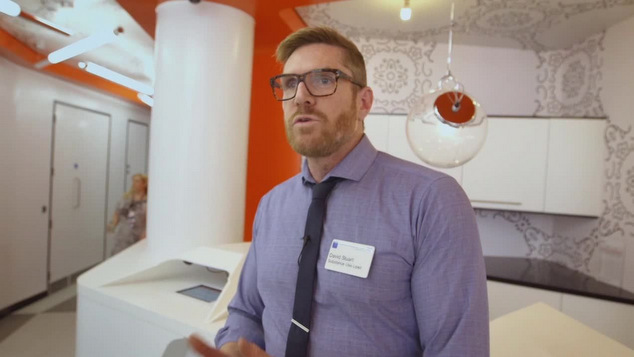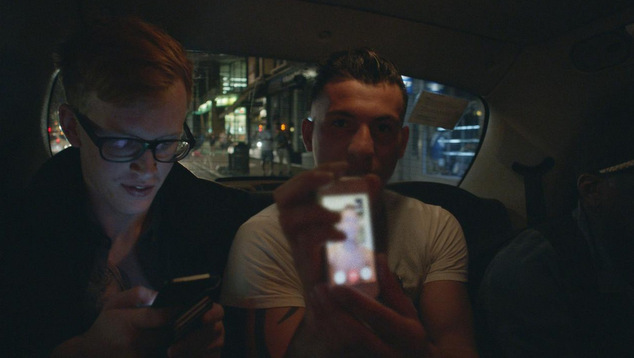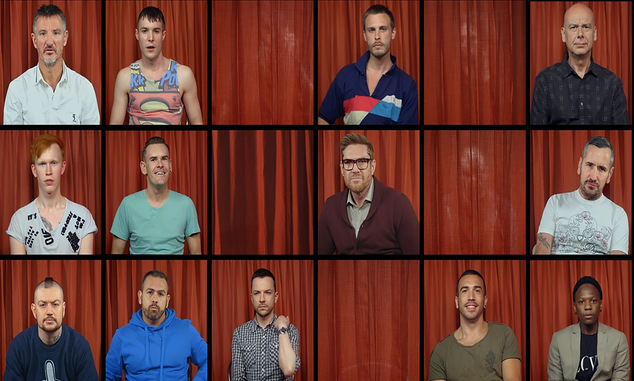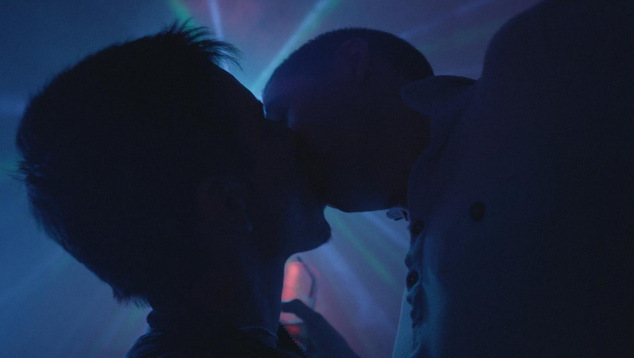
The confronting documentary Chemsex is screening in Perth this month. The film dives deep into the largely underground gay subculture that pursues the hedonistic, often unsafe thrills of drug driven sex. GHB and crystal meth are the drugs of choice.
Tackling the health challenge is David Stuart, the substance abuse lead at London’s 56 Dean St Clinic (pictured above), a ground breaking service that tackles drug use and sexual health concurrently. Stuart spoke to OUTinPerth about his organisation’s approach to changing behaviours.
Review: Chemsex

Chemsex (R)
Directed by William Fairman and Max Gogarty
★★★★
This scary British documentary captures footage of gay men who combine psychoactive drugs and multiple-partner sex on London.
It is frightening because health issues of unsafe sex with HIV-positive men are disregarded and social media and hook-up sites make it easy to engage in weekend-long drug-fueled orgies.
Honest interviews with participants show the allure but there are also scary admissions of these dark fantasies causing harm to susceptible young (and not so young) men who have lost touch with sobriety.
David Stuart, who runs London’s Soho sexual health clinic, speaks about the health crisis and many of those interviewed are his patients who are trying to detox.
There are some explicit sexual and drug-related scenes, but the most disturbing parts are interviews with guys having psychotic drug-induced experiences.
Lezly Herbert
Chemsex screens as part of Revelation Perth International Film Festival on Sunday 10 July (Cinema Paradiso) and Wednesday 13 July (Luna Cinema).
Many of the medical professionals I watched the documentary with were impressed that you’ve developed a program that allows people to access mental health, drug services and other counselling at that same time.
Tell us more about that model and why it works.
ChemSex is such an odd and challenging public health issue, because so many different disciplines of care are required to address it; it is also associated with some unique behavioral and cultural idiosyncrasies that require a pooling of experience and skill to respond effectively.
My own, immediate response to ChemSex twelve or so years ago, was to skill up those working in substance use services; it seemed like an obvious place to start. But the most common harms were so dissimilar to those associated with heroin, crack cocaine or alcohol, and were more associated with sexual health and HIV – and uniquely, gay sexual health.
Staff in drug services were often unaware of PEP, undetectable viral loads or ARV adherence; or how to coach chem users in gay HIV/STI prevention. So it then seemed obvious to shift that care to sexual health clinics, where gay men would naturally go to discuss gay sex, and where STI/HIV epidemiology, care and prevention was built in.
But although the sexual health care was appropriate in sexual health settings, staff there were sometimes less skilled at supporting people to identify and manage cravings, at relapse prevention techniques, creating Care Plans to support people with drug use. So we needed to gather a multi-disciplinary team that included both these skill sets.
But that wasn’t enough either; there were so many uniquely gay cultural and historical factors that were contributing to ChemSex, that neither of these teams had built in. Staff didn’t necessarily understand what looking for a shag on Grindr on a lonely Saturday night could be like; or the rejections that a gay man has to deal with online; the slut shaming, the camp-shaming, the rejections based on race or body fascism.
To address ChemSex competently, staff also needed a cultural understanding of what it’s like to have one’s sex and romantic life endemically associated with risk and danger due to 30 years of HIV epidemic. They needed to know how to navigate the abbreviations, code words and chem-availability that exists on sexual networking apps.
The model of care I’ve created at 56 Dean Street gathers a multi-disciplinary team that includes mental health, sexual health, and substance use expertise and support workers/peers from the gay community.
What reaction have you had to the documentary since it first came out?
This film is a challenging watch. It’s difficult. My international colleagues from the health sector find it to be helpful in regard to contextualising ChemSex; they are able to watch it objectively, see it as a film about a health syndemic affecting a vulnerable population navigating their way through some complicated cultural changes.
A lot of documentary film buffs have responded favorably to the film too, at international film festivals. I think it’s more challenging for gay men to experience though; many of us remember the damaging headlines of the 1980’s, and many of us remember the stigma caused by fear-mongering health campaigns, and misery-laden films about AIDS. These were traumatic times, and many of us need, rather urgently, to see ourselves portrayed on the big screen in a positive light.
Some have charged this film with the responsibility of communicating gay sexual liberation favorably, or of being a safer drug use campaign, or of balancing the story with tales of non-problematic drug use. Some watching this film feel a defensive and protective urgency to defend gay men and communities from how heterosexuals might perceive gay men, and gay culture, as a result of this film; almost as if 1985 will happen all over again.
These are heavy burdens for an 80 minute film. It’s no more than a story of the struggles some gay men in London are having negotiating their sex lives and well-being in a city with a high ChemSex prevalence.
But this film does ask us, quite unapologetically, to look at the role sex plays in our lives, cultures and scenes. It asks us to examine how we have defined gay sexual liberation, putting that into context with the struggles we have fought through the last 40 years, and how it may need to be interpreted for a different generation; how it may need to be interpreted to accommodate new technologies like Grindr and online communication, modern HIV stigmas and challenges, new easily-available drugs, and how we understand and pursue sex, relationships and intimacy in modern times. This is an uncomfortable ask.
So the response has been polarizing. Personally… I acknowledge heavily, that the film is upsetting, but I feel that these issues need to be placed, not only on public health agendas, but firmly within the dialogue of our own communities. I hope the film has initiated that dialogue, and despite the attention it’s focused on our sex lives, I feel that we are resilient, extraordinary gay men and communities, and we will see ourselves through this difficult time.

Do you think the Chemsex challenges you see in London are similar to other cities, or does London have its own unique set of challenges?
I have found each city I’ve visited to have different challenges in regard to ChemSex. There are many commonalities, mostly associated with gay culture, sexual networking Apps, HIV and gay scene ‘norms’; the differences can be around the availability of different drugs, drug use stigma, the varying associations between Chems and HIV transmission.
Australia has some unique challenges, in that meth (ice) use is widely used outside the gay communities, which is not the case in the UK. Australia has also seen some hard-hitting ice campaigns that (some argue) have created a greater stigma about ice use, making a cultural dialogue about the issues more problematic, and in some cases, making it less likely that certain people (like gay men) access support services.
The most important thing, when this film travels to other cities, is that the cultural dialogue that it triggers, is led by local community voices; people who can view the film objectively, support audiences to interpret the film to local cultural idiosyncrasies, and guide the response with loving, community-minded cool heads.
How do you suggest we might get to point where we can openly talk about sex and drug use? Even in 2016 they’re still topics we hold back on talking about.
So true. ChemSex will inevitably go hand in hand with moral judgments, personal beliefs about problematic drug use vs non-problematic use, personal beliefs about what safe sex is, about the politics of sex-positivity etc etc. Some of this discussion will unravel some of the concepts we hold about gay life, gay sex and health promotion; and we may not be ready to be unraveled.
In London where we have a more urgent need to discuss ChemSex, and where there is a consensus that we have an issue, the community has responded culturally, with ChemSex-focused open-mic nights, many West End theatre productions addressing ChemSex… there’s even a Naked Boys Reading event where ChemSex has been the theme. I attended a ChemSex photography exhibition a few weeks ago, that invited us to explore the role sex and drugs plays in our lives.
We’ve been re-designing our gay scenes, which can sometimes be very bar/club/sauna/sex focused, to be scenes with more cultural options for our recreation. Scenes imbued with a discourse about issues that affect our lives and wellbeing. If there is a need for this in Perth… I hope the community responds similarly. We, gay men, have a long tradition of community activism in crises.

How much do you think Chemsex plays into our increasing rates of new HIV infections?
At 56 Dean Street we prescribe between 200 and 300 PEP courses to gay men each month, immediately following a ChemSex situation. That alone, tells us how great a role ChemSex plays in HIV transmission. How many more are not getting to the PEP clinic in time? How many of these are unaware of PEP?
We diagnose between 40 and 60 gay men with HIV each month; it’s difficult to know how many of these are directly resulting from ChemSex situations, but we do know that 3,000 gay men accessing our clinic each month, are chem users.
We know that the Chem high and environment can lend itself toward taking bolder risks that seem sexy at the time (but often with regrettable consequences).
I’m not sure what the HIV situation is in WA, but a survey of how many PEP presentations were associated with Chems would help identify if that is a problem in Perth or not – remembering that ChemSex is not solely about injecting ice- the majority of our ChemSex patients do not inject, but smoke, sniff and drink ice, mephedrone and GHB/GBL (respectively).
What advice would you give to someone who is concerned about their sexual activity and drug taking activity?
I’d ask myself some questions firstly; when did I last have sober sex? What do I want my sex life to be like? How do I want my future sex/romantic life to be? Am I enjoying the sex I’m having? What are the joys of chems, what are the consequences; I’d weigh those two against each other to help me decide how concerned to be.
My advice then would be to firstly discuss it with a friend. I like to believe that it’s our own, unnecessary shame that makes us keep it to ourselves, and that is so unhelpful. There’s no shame in it, we all “get it”, as gay men. If you can’t or don’t have that friend, discuss it in a sexual health setting, or a gay setting.
You can’t separate the gay sex from the ChemSex, so it’s likely to be more effective to discuss it with a health professional who gets what gay sex in a big city is like in 2016. It’s unlikely that anyone will force an intervention on you; make it clear you just want to discuss it, in a non-judgmental setting – and make your own mind up if you want to make any changes. But it’s always, always better to be informed, and not to do it in a shroud of shameful secrecy.

Support Services
To find about more about HIV head to the WA AIDS Council www.waaids.com.au
Call the AIDS line on 9482 0044 or email aidsline@waaids.com
For sexual health testing services visit www.mclinic.org.au
For help with drug use contact the Alcohol and Drug Support line on 9442 5000, country callers can call 1800 198 024.
Tell us more about some of the ways 56 Dean Street connects with the community. How do you avoid boring health promotion?
We’re fortunate at 56 Dean Street to be at the front line of changing trends. And London has such a large population, experiences so much tourism (including gay tourism) that means we’re constantly playing catch up with HIV prevention.
It’s easy to get stuck in a 1990’s ethic of sexual health and HIV prevention, where we simply make condoms available, teach people how to use them, create health promotion posters and flyers to stick in bars and clubs, and hope that’s enough.
We can’t simply segregate gay populations into HIV positive and HIV negative risk groups or therapy groups, when we are all one community, all of us having a status, be it positive, negative, undetectable, on PrEP, etc. Gay life, gay culture and gay sex has changed so much lately, with changing attitudes to HIV, our online lives, changing societal homophobia…
Our patients were telling us that they felt nervous taking their clothes off with complete strangers they’d met online… but were doing it anyway, because “that’s what everyone does”. They were telling us they felt a huge weight of expectation upon sexual performance and prowess, online, on our scenes and in the bedroom, and that communicating any vulnerability often led to rejection. They told us that what they were “advertising” in their online profiles was so far removed from who they actually were, and that they were poorly-equipped to communicate their sexual and emotional needs online.
What we found odd was – they were telling us this in clinic, but not telling their lovers, partners, friends or family. They felt the bars, clubs, saunas and scenes, though lots of fun, were not necessarily conducive to their emotional needs, and some of these gaps were manifesting as unhappy sex/romantic lives (or in some cases, more STI’s than they’d like).
Our health promotion focuses on recreational activities beyond (or embedded into) the bars clubs etc; we are trying to support our communities to have more cultural options as gay men; I’ve mentioned some earlier, but safe spaces that are conducive to our emotional and community needs.
Spaces where we can talk about sex (not just sexual health), talk about being horny, being vulnerable, about the best sex we’ve had, and the worst. About rejections online, about how good chems make us feel as well as the easy availability and the consequences. These issues should not be confined to consultation rooms in health clinics, or segregated support groups.
Sexual health clinics play a huge part in many gay mens lives, and within our communities. We have to honor that responsibility, learn from the needs of our communities, especially during changing times like these – and be so much more than a clinic that picks up the pieces after mistakes have been made, but be fully participatory members of a thriving, changing community.
Chemsex is screening at the Revelation International Film Festival on Sunday 10 February at 8:45pm at Cinema Paradiso, and Wednesday 13 July at 6:45pm at Luna Leederville. Find out all the details at www.revelationfilmfest.org
Graeme Watson



